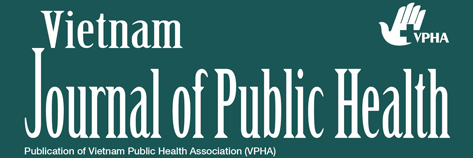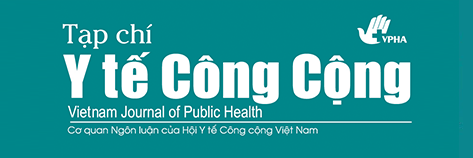Thảo luận về nâng cao sức khỏe tại Việt Nam (Interpreting health promotion in Vietnam context)
Tóm tắt
Mục đích cảu bài báo là phiên giải nâng cao sức khỏe (NCSK) và các khái niệm liên quan trong điều kiện Việt Nam, từ đó giúp hiểu rõ hơn và thúc đẩy các hoạt đông NCSK. Bằng trích dẫn định nghĩa của Tổ chức Y tế thế giới (WHO) năm 1946 về NCSK, tác giả đã giải thích sức khỏe tồn tại dưới ba trạng thái: Khỏe mạnh, không bệnh không tật và có bệnh, tật. Các trạng thái này luôn chuyển đổi do tác động của các yếu tố quyết định sức khỏe. Các yếu tố này bao gồm yếu tố cá nhân (sinh học và xã hội); môi trường nơi sống, làm việc, học tập; môi trường xã hội; bối cảnh chung và môi trường tự nhiên. Các tiếp cận đối với sức khỏe cũng được xác định, bao gồm: tiếp cận lâm sàng, tiếp cận phòng bệnh và tiếp cận NCSK. Từ đó tác giả đã đưa ra giải thích về định nghĩa NCSK và phân biệt với các khái niệm khác rất thông dụng ở Việt Nam như truyền thông- giáo dục sức khỏe, phòng bệnh. Các lĩnh vực hoạt động và các giải pháp đối với các nhóm yếu tố quyết định sức khỏe cũng được chỉ rõ. Các lĩnh vực này bao gồm phát triển kiến thức và kỹ năng cá nhân, xây dựng môi trường sống, học tập, làm việc NCSK, xây dựng và thực hiện các chính sách và cuối cùng là hợp tác toàn cầu.
English abstract
The purpose of this article is to interpret Health Promotion (HP) and related concepts in the Vietnamese context to facilitate understanding and promote action for HP. The article begins with citing the World Health Organization definition about health from 1946 and explains that health status exists in three states: Good health, absence of diseases and infirmity, and lastly illness. These three states are constantly changing from one to another. The article then summarizes the determinants of health. These include individual factors (biological and soccial), setting factors (residence, workplace, school); social determinants; and global and natural factors. Health approaches including medical, the disease prevention and HP approaches are identified. The article then outlines the HP concept and differentiate it from other concepts such as heath education and communication; disease prevention. Lastly the article summarizes the action area, strategies and measures appropriate for each group of health determinants. These mainly comprise of developing personal knowledge and skills, promoting healthy settings, building and implementing healthy policies, and global collaboration.
Từ khóa
Toàn văn:
PDF (English)##submission.citations##
Tài liệu tiếng Việt.
Bộ Y tế (2006), Tài liệu hướng dẫn về nâng cao sức khỏe.
Trung tâm Truyền thông GDSK, Bộ Y tế (2009). Giáo trình nâng cao sức khỏe. Tài liệu tập huấn.
WHO (2006), Giáo dục sức khỏe – Sách học về giáo dục sức khỏe trong chăm sóc sức khỏe ban đầu, (Sách dịch).
Tài liệu tiếng Anh.
Bernie Marshall (2009), outline of health promotion training manual, mission report of consultancy for Viet Nam in 2009.
Department of Human Service, Victoria state, Australia, 2008, Integrated health promotion resource kit.
Dahlgren, G., whitehead, M.(1991). Policies and strategies to promote social equity in health. Stockholm: Institute of Future Studies.
Helen Keleher and Bernie Murphy (2004). Understanding Health: A determinant approach.
Jenie Naidoo, Jane Wills (2000), Health Promotion- Foundations for practice.2nd edition
John Germov (2005). Second Opinion - An Introduction to Health Sociology. 3rd edition.
Karen Glanz et all (2002). Health Behavior and Health Education. Theory, Research and Practice, 3rd ed, published by Jossey-Bass.
World Health Organization (2009), Milestone in Health Promotion: Statement from Global Conference (available at: http://who.int/healthpromotion/milestone.pdf
World Health Organization, 2008, Regional Strategy for Health Promotion for South- East Asia.
WHO (2003). Social determinants of health: 10 solid facts.
World Health Organization, Regional Office for the Western Pacific, 2002, Regional framework for Health Promotion.
World Health Organization (1986), Ottawa Charter for Health Promotion, Geneva.



